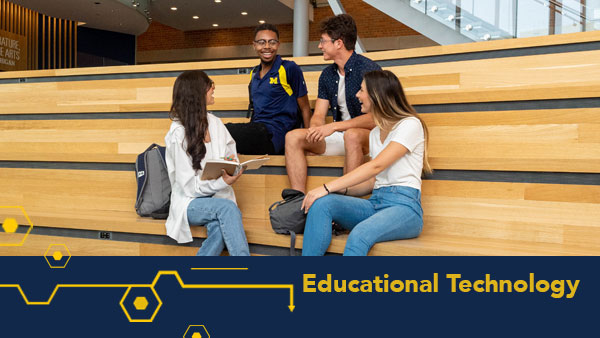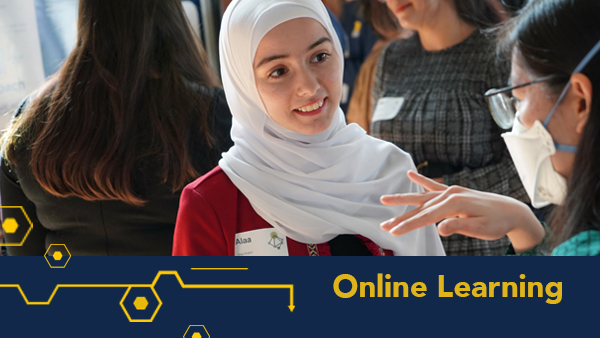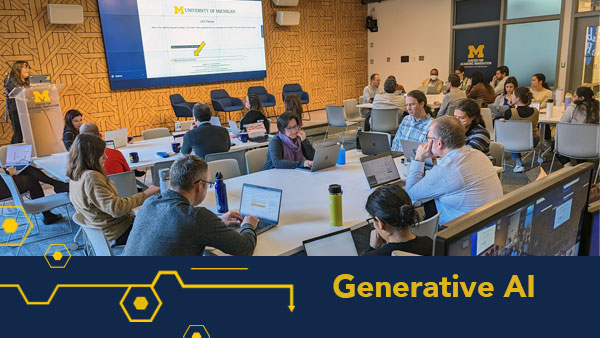This article was originally posted on 10/11/2017 on Inside Higher Ed
Full presentation viewable here
James DeVaney, Associate Vice Provost for Academic Innovation
@devaneygoblue
To realize our preferred future of higher education, we have to create a vision of it. Growing up in one college town and spending my career in others, I took for granted until very recently that college towns are unique platforms for learning. Now I’m betting on the notion that like many other platforms, college towns are scalable. If this turns out to be true, a whole new world of possibilities for two-way public engagement is within reach.
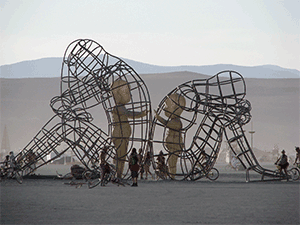
When living in a college town, you begin your pursuits with a goal of seeking greater understanding, not with the goal of confirming a current set of beliefs. Fundamental to the dynamic university communities that anchor these unique college towns is compassion. Compassion, it turns out, is essential to discovery and discovery is at the center of a vibrant and healthy society. It’s time to invest time and treasure in the compassionate public square for the information age.
I’m proud of the real and vital commitments my own institution, the University of Michigan, has made to academic innovation, public engagement, and diversity, equity and inclusion. These mission-aligned investments fit together like puzzle pieces and signal to our community and the world that the leading public research university will continue its long-standing commitment to innovation, inclusion, excellence, and social justice well into the future.
As I’ve settled into my role at U-M over the last three and a half years, I’ve discovered there are many universities such as Davidson College, Georgetown University, and Dartmouth College, who share our values and sense of urgency. Another institution I’ve come to admire greatly is Duke University. So it was a joy to receive an invitation to speak at the Duke NextEd Festival last week in Durham to kickoff a community conversation around innovative ways to make the Duke educational experience more engaging, transformative, and equitable.
In my remarks on “Academic Innovation and the Compassionate Public Square” (full remarks and presentation viewable here), I described a problem: If the world of facts and basic research is no longer valued by society, we have a problem of relevance, not existence.
I then described how we are leveraging our model for academic R&D to design solutions to this problem of relevance. Universities watched as the bootcamp industry grew outside of academia. There is clear demand for just-in-time learning. We should take note but resist imitation. There is a real opportunity for universities to reclaim and reimagine the bootcamp concept and bolster leading research enterprises with a new capability for agile curriculum development. Imagine the power of just-in-time community problem solving fueled by the expertise and lived experiences of universities and their growing global learning communities.
College towns are platforms that need to be scaled. Higher education institutions regularly transform society while also providing anchors for tradition and values. Whether it’s accelerating or pacing, institutions are constantly influencing the velocity of societal change. We’re applying an academic R&D mindset at Michigan and it’s starting to scale. We are creating a model for agile curriculum development differentiated by the capacities of a vast research enterprise. This is about relevance.
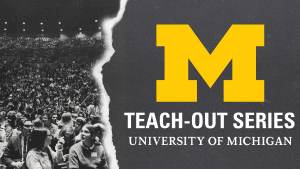 To provide an example of academic R&D in action, I described in my remarks the evolution of the Teach-Out model as a new opportunity for two-way engagement with the public. It is now possible to move from a producer push model to true conversation with a global public community. Through a dialogue-based approach we set higher expectations of the public as content creators and active participants. College towns are the greatest. And they can do better to facilitate compassionate and critical conversations around the issues most important to society.
To provide an example of academic R&D in action, I described in my remarks the evolution of the Teach-Out model as a new opportunity for two-way engagement with the public. It is now possible to move from a producer push model to true conversation with a global public community. Through a dialogue-based approach we set higher expectations of the public as content creators and active participants. College towns are the greatest. And they can do better to facilitate compassionate and critical conversations around the issues most important to society.
The Teach-Out puts institutions, individual scholars, and diverse public stakeholders into conversation about real-time contemporary issues. By scaling communities that are bound together by a commitment to discovery, and moving beyond a broadcast model for public engagement, we have a much greater chance of activating public concern and elevating public discourse.
They day after I visited Duke for the NextEd Festival I returned home to Ann Arbor in time to listen to U-M’s President Mark Schlissel establish new commitments to reimagine public engagement. Building from a long history of public engagement and academic innovation at U-M, our mode of connected experimentation is about recognizing the diversity of learners in any large population and figuring out how to use technology not just to transmit but to help learners construct their own understanding of the world. Through meaningful two-way engagement we strengthen the U-M community and increase the power of our collective potential in pursuing new discoveries and greater understanding.
U-M was founded in 1817 to serve the Michigan Territories. In 2017, U-M is poised to create a compassionate public square through a growing and tangible focus on global and lifelong learning. A compassionate square that is virtuous, vibrant, vital, and vast, can only serve to elevate public discourse, not distort.
What I love about hearing from my colleagues at Duke, Davidson, Georgetown, Dartmouth and others, is that each institution is finding its own way. The magnitude of opportunities ahead is far greater than the capacity of any single institution and many solutions are needed in order to establish a an environment in which society and the academy learn from each other. U-M will celebrate academic innovation and public engagement at our Academic Innovation Initiative Summit next month. I hope other institutions will continue to design and share innovative solutions to two-way engagement with the public.
